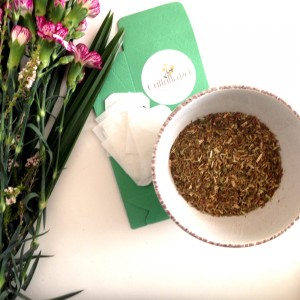Tulsi (Holy Basil) has been used for thousands of years in the traditional medicinal of India, Ayurveda. Known to Hindus as Tulsi the plant is also used in religious ceremonies. Holy Basil is used in Ayurvedic medicine for common colds, headaches, stomach disorders, inflammation, heart disease, various forms of poisoning, and malaria.
Tulsi (Holy Basil) is an excellent example of an adaptogen herb that can help relieve the stress of modern living. Oxidation caused by free radicals and chronic inflammation are potent sources of mind and body stress. Sipping tulsi-leaf and other green leaf teas let us “borrow” some of the adaptogenic and antioxidant chemicals that plants produce when making oxygen in their leaves. The phytochemical ursolic acid has a pronounced anti-inflammatory action and is a selective COX-2-inhibitor. It is similar to green tea in its anti-tumor and anti-ulcerative properties. Many clinical studies now support the folklore traditions of holy basil as a safe neuroprotective, that protects the brain against degenerative diseases.
Preparation Methods & Dosage: Teas, dried powder, fresh leaf, or mixed with ghee. Holy Basil essential oil is used in skin preparations and cosmetics.
Holy Basil Side Effects: NA
Natural Tulsi Tea Bags x 25
6.50 $
Medicinal Uses: * Ayurvedic * Colds * Congestion * Flu * Herbal Teas * IBS * Memory/Focus * Nausea * Stress
Properties: * Adaptogens * Antibacterial * Antitussive * Aromatic * Carminative * Demulcent * Diaphoretic/sudorific * Diuretic * emetic * Febrifuge * Insect repellents * Laxative * Parturient * Stomachic
Parts Used: Leaves
Constituents: ascorbic-acid, beta-carotene , beta-sitosterol, carvacrol, eugenol, linoleic-acid, methyl-chavicol , oleic-acid, mucilage , palmitic-acid , saponins,stearic-acid, tannin
| Weight | 0.025 kg |
|---|




Reviews
There are no reviews yet.